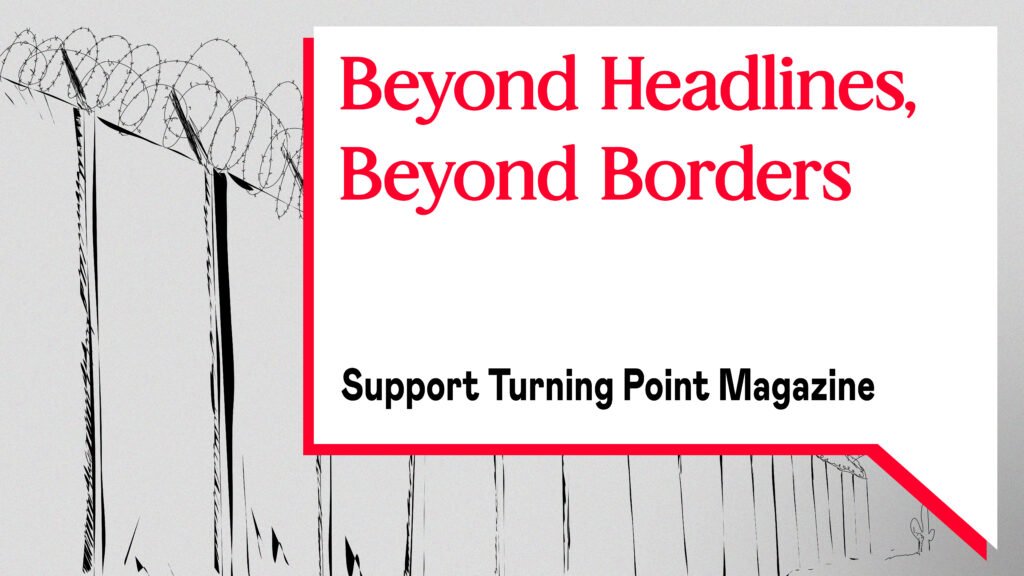Cover photo: A panoramic view of protesting students surrounding the art installation in front of Columbia University’s Low Memorial Library. First published in Hyperallergic. ©Mukta Joshi
For nearly two years I have, like you, seen and unseen and seen again all the images of murdered children, murdered mothers, murdered fathers, in Gaza.
And then, in the last two years, there has been the lesser, albeit significant pain, of seeing my alma mater Columbia University, being torn apart. I have a long history with Columbia, having received my bachelor’s and Master of Fine Arts there, as well as working there as an executive assistant for six years. And now, I teach there, too. For the last few decades, it has been my only constant in New York. Up until recently, when I’ve arrived on campus to teach, and come through the trees across College Walk, onto the Quad, and seen the ancient names inscribed on Butler Library, I have often felt as if I’ve come home.
But this past year, that feeling for me irrevocably changed. People have asked me which semester was worse on the campus, the spring of ’24, or the spring of ’25. Last year, beneath the soundtrack of swarming helicopters, I walked into the Gaza Solidarity Encampment days before its final dismantling. And how did I feel? I felt hopeful despite that panicked soundtrack, despite my grief over the ongoing genocide.
But this past semester, I didn’t feel hope. And I didn’t feel at home. I felt only fear. I felt betrayed. After Mahmoud Khalil, the pro-Palestine activist and gentlest, most passionate encampment lead negotiator, was abducted on March 8th of this year, I wrote my lawyer friend’s number on my wrist with permanent marker.
When I had my office hours with a student beneath the first spring sun, we watched as two plain clothes cops marched up the steps directly toward where we were sitting. For a good half a minute, I did not know whether they were coming for us or just toward us.
In class, a student asked me to repeat the chants being sung by protestors who passed our window Thursday after Thursday, and I said, “why would I repeat them when you can hear them for yourself?” The truth was I was afraid I was being recorded. Spied on. And it wasn’t all paranoia..
A colleague of mine was tipped off that an anonymous student had reported them for their lectures which advocated for solidarity with the protestors. Various pro-Israel forces on and off campus began publishing the names of professors on social media platforms and quoting content from their ostensibly privately-held classes. This is nothing new either. When I was an undergrad, after the release of the documentary Columbia Unbecoming, outside ‘auditors’ would sit in on Middle Eastern studies classes to catch supposedly antisemitic content.
On June 20, after over three months in detention, Mahmoud Khalil was finally released. His freedom feels personal. Not only was he a fellow Columbian, his family was from the Galilee region of Palestine, like my own, and like my own, displaced to a refugee camp in Syria. Days later, he appeared freely on the steps of St. John the Divine. In his speech, he saluted the courage of all the students at Columbia. It’s incredible that the University which has capitulated most to the forces of injustice feigns to be the “home” of the bravest student body on Earth.
After the speech, Khalil led a march right back up to the gates of Columbia, flanked by fellow protestors. Unafraid, unapologetic, undeterred. Watching him, I understood that I had been wrong about Columbia before. It, in and of itself, wasn’t ever my home. After all, home only persists in people. Those students, the ones arrested, the ones Khalil praised, and Khalil himself—they are my Columbia. In Lumine Tuo Videbimus Lumen. In your light, shall we see light.
Hannah Lillith Assadi
Hannah Lillith Assadi is the author of Sonora, The Stars Are Not Yet Bells and Paradiso 17 which is forthcoming from Knopf in 2026. She teaches fiction at the Columbia University School of the Arts and the Pratt Institute.




